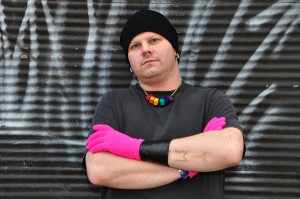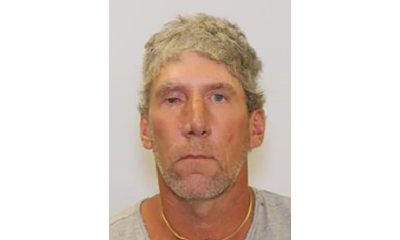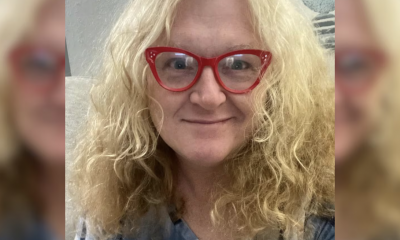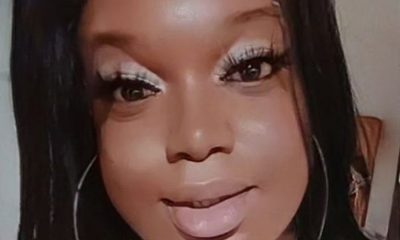Local
Gay man charged with ‘hate crime’
Says he defended himself against basher on 17th Street
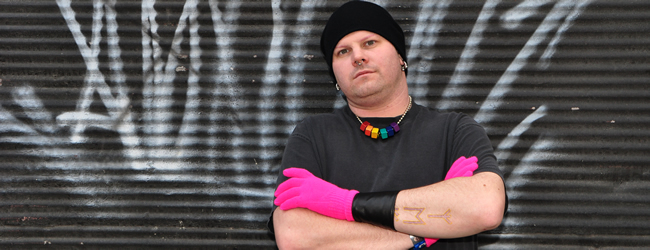
D.C. police Sunday night charged a gay man with a gay-related hate crime following an altercation with a panhandler on the sidewalk outside the 17th Street, N.W. gay bar JR’s.
The United States Attorney’s office dropped the hate crime designation the next day at an arraignment in D.C. Superior Court for Kevin “Jaden” Perry, 35, who says he’s a member of the local group called Radical Faeries.
But based on a police account of what happened, prosecutors with the U.S. Attorney’s office charged him with assault, possession of a prohibited weapon (a chain), and threats to do bodily harm to the panhandler. A judge released him on his own recognizance while he awaits a possible trial.
Perry and two friends who were with him dispute the allegations, saying the panhandler started the incident by calling Perry a faggot and raising his fists near Perry’s face when Perry refused the man’s request for money.
“I never assaulted the guy,” Perry told the Blade at the courthouse after his arraignment. “I called him out for calling me a faggot,” he said. “I was on 17th Street on a gay street and I just wasn’t going to take that.”
A police report filed in court, based on accounts by the panhandler and an unidentified witness, quotes Perry as calling the panhandler a “faggot” at the time Perry allegedly assaulted him.
“I will kill you. You’re a faggot,” the report quotes Perry as saying. “I’m a real faggot, bitch. You don’t want to fuck with a real faggot, bitch. I will fucking kill you.”
When asked about the police report, Perry said he never threatened to kill the panhandler and never physically assaulted him. He said he used the word faggot in the form of a question after the panhandler hurled that word at him.
“What I said was, ‘faggot? I’ll show you a faggot. I’ll whup your ass if you hit me,’” Perry told the Blade. “I never threatened to kill anybody.”
Perry continued, “Had he not thrown the first punch I would have walked away because honestly at that time I just wanted to go the McDonald’s and go … home.
“And he had to throw a punch and that’s when I lost it because I don’t take that shit,” he said. “I refuse to be victimized. You know, if you act like a victim you’re going to be treated like a victim.”
Roy Alexander, one of two friends who were with Perry at the time of the incident, backed up Perry’s version of what happened. He said that while Perry did call the panhandler names as the two “cussed at each other,” he never heard Perry threaten to harm the man.
“I was right there,” Alexander said. “The police talked to me. I told them what happened … The fact that I’m not even mentioned in the police report says something.”
“There’s been a lot of gay bashings in this city, and we seem to get attacked because we come across as weak,” Alexander said. “And now when someone stands up for himself he gets accused of a crime. This is just insane.”
D.C. police initially charged Perry with a bias-related assault with a dangerous weapon (a chain); felony threats; and simple assault after the panhandler and a witness told police Perry attempted to strike the panhandler with a chain he pulled from his pocket and punched the man in the back.
The report says Second District Police Officer La Vida Ellerbe, who is an affiliate member of the police’s Gay & Lesbian Liaison Unit, was on the scene and played a role in listing the incident as a hate crime.
The police report says the panhandler and the witness reported that Perry swung his chain at the panhandler and missed hitting him. An attempt to hit someone is considered an assault even if the attempt fails under criminal assault laws.
According to the police report, the panhandler and the witness said the chain fell out of Perry’s hand and landed on the ground and the panhandler picked it up and started to run away. It says Perry chased after the man. It says the panhandler reported Perry punched him in the upper back with a closed fist. The witness reported seeing Perry “throw a punch” toward the panhandler’s back, the police report says.
Perry denies he swung the chain at the panhandler, saying he swung it in the air in a circular motion as a warning that he would use it to defend himself if the panhandler attacked him. Perry said the panhandler swung the chain in the same circular motion but leaned forward toward him when the panhandler picked up the chain after Perry dropped it.
Perry said that in the heat of the moment, after the panhandler raised his fists like a boxer, he may have lunged at the man with his fist “but I never actually made contact.”
When told of the police report’s contents, Alexander said he never saw Perry wield the chain as if to attempt to strike the panhandler. He said he did not hear Perry threaten to assault or kill the panhandler as stated in the report.
At the courthouse, Perry said he feared that the panhandler was about to hit him because he raised his fists and moved toward him as if he were going to assault him.
He pleaded not guilty to the charges and was released by a judge, who agreed to a request by Assistant U.S. Attorney James Perez that Perry be prohibited from returning to the 1500 block of 17th Street., N.W., where JR.’s is located, until the case is resolved. Perry is scheduled to return to court for a hearing on Feb. 14.
William Miller, a spokesperson for the U.S. Attorney’s office, said he couldn’t immediately determine why prosecutors didn’t classify the charges against Perry as a hate crime. He said that similar to all cases at the arraignment stage, prosecutors could file additional charges at a later date if new information surfaces to warrant such charges.
“These are the initial charges,” he said.
The police report describes Perry’s chain as being between two and three feet long and of “medium gauge.”
In an interview at the courthouse following his arraignment, Perry said the chain was part of the leather-oriented clothes he wore on the night of the incident. He wore the same clothes upon his release at the courthouse: a black leather jacket and military camouflage pants.
Despite his appearance, Perry said he regularly performs in drag and had been involved, before moving to D.C. from San Francisco last year, in a group called the Sisters of Perpetual Indulgence. The group consists of men dressed as nuns who perform satirical skits to poke fun at the Catholic Church’s position on homosexuality and gay rights.
He said he had planned to form a Sisters of Perpetual Indulgence group in D.C. but said his arrest this week, which he believes was unjustified, plus his inability to find a job in D.C., has prompted him to decide to move to Baltimore.
District of Columbia
Bowser budget proposal calls for $5.25 million for 2025 World Pride
AIDS office among agencies facing cuts due to revenue shortfall

D.C. Mayor Muriel Bowser’s proposed fiscal year 2025 budget includes a request for $5.25 million in funding to support the June 2025 World Pride celebration, which D.C. will host, and which is expected to bring three million or more visitors to the city.
The mayor’s proposed budget, which she presented to the D.C. Council for approval earlier this month, also calls for a 7.6 percent increase in funding for the Mayor’s Office of LGBTQ Affairs, which amounts to an increase of $132,000 and would bring the office’s total funding to $1.7 million. The office, among other things, provides grants to local organizations that provide services to the LGBTQ community.
Among the other LGBTQ-related funding requests in the mayor’s proposed budget is a call to continue the annual funding of $600,000 to provide workforce development services for transgender and gender non-conforming city residents “experiencing homelessness and housing instability.” The budget proposal also calls for a separate allocation of $600,000 in new funding to support a new Advanced Technical Center at the Whitman-Walker Health’s Max Robinson Center in Ward 8.
Among the city agencies facing funding cuts under the mayor’s proposed budget is the HIV/AIDS, Hepatitis, Sexually Transmitted Disease, and Tuberculosis Administration, known as HAHSTA, which is an arm of the D.C. Department of Health. LGBTQ and AIDS activists have said HAHSTA plays an important role in the city’s HIV prevention and support services. Observers familiar with the agency have said it recently lost federal funding, which the city would have to decide whether to replace.
“We weren’t able to cover the loss of federal funds for HAHSTA with local funds,” Japer Bowles, director of the Mayor’s Office of LGBTQ Affairs, told the Washington Blade. “But we are working with partners to identify resources to fill those funding gaps,” Bowles said.
The total proposed budget of $21 billion that Bowser submitted to the D.C. Council includes about $500 million in proposed cuts in various city programs that the mayor said was needed to offset a projected $700 million loss in revenue due, among other things, to an end in pandemic era federal funding and commercial office vacancies also brought about by the post pandemic commercial property and office changes.
Bowser’s budget proposal also includes some tax increases limited to sales and business-related taxes, including an additional fee on hotel bookings to offset the expected revenue losses. The mayor said she chose not to propose an increase in income tax or property taxes.
Earlier this year, the D.C. LGBTQ+ Budget Coalition, which consists of several local LGBTQ advocacy organizations, submitted its own fiscal year 2025 budget proposal to both Bowser and the D.C. Council. In a 14-page letter the coalition outlined in detail a wide range of funding proposals, including housing support for LGBTQ youth and LGBTQ seniors; support for LGBTQ youth homeless services; workforce and employment services for transgender and gender non-conforming residents; and harm reduction centers to address the rise in drug overdose deaths.
Another one of the coalition’s proposals is $1.5 million in city funding for the completion of the D.C. Center for the LGBTQ Community’s new building, a former warehouse building in the city’s Shaw neighborhood that is undergoing a build out and renovation to accommodate the LGBTQ Center’s plans to move in later this year. The coalition’s budget proposal also calls for an additional $300,000 in “recurring” city funding for the LGBTQ Center in subsequent years “to support ongoing operational costs and programmatic initiatives.”
Bowles noted that Bowser authorized and approved a $1 million grant for the LGBTQ Center’s new building last year but was unable to provide additional funding requested by the budget coalition for the LGBTQ Center for fiscal year 2025.
“We’re still in this with them,” Bowles said. “We’re still looking and working with them to identify funding.”
The total amount of funding that the LGBTQ+ Budget Coalition listed in its letter to the mayor and Council associated with its requests for specific LGBTQ programs comes to $43.1 million.
Heidi Ellis, who serves as coordinator of the coalition, said the coalition succeeded in getting some of its proposals included in the mayor’s budget but couldn’t immediately provide specific amounts.
“There are a couple of areas I would argue we had wins,” Ellis told the Blade. “We were able to maintain funding across different housing services, specifically around youth services that affect folks like SMYAL and Wanda Alston.” She was referring to the LGBTQ youth services group SMYAL and the LGBTQ organization Wanda Alston Foundation, which provides housing for homeless LGBTQ youth.
“We were also able to secure funding for the transgender, gender non-conforming workforce program,” she said. “We also had funding for migrant services that we’ve been advocating for and some wins on language access,” said Ellis, referring to programs assisting LGBTQ people and others who are immigrants and aren’t fluent in speaking English.
Ellis said that although the coalition’s letter sent to the mayor and Council had funding proposals that totaled $43.1 million, she said the coalition used those numbers as examples for programs and policies that it believes would be highly beneficial to those in the LGBTQ community in need.
“I would say to distill it down to just we ask for $43 million or whatever, that’s not an accurate picture of what we’re asking for,” she said. “We’re asking for major investments around a few areas – housing, healthcare, language access. And for capital investments to make sure the D.C. Center can open,” she said. “It’s not like a narrative about the dollar amounts. It’s more like where we’re trying to go.”
The Blade couldn’t’ immediately determine how much of the coalition’s funding proposals are included in the Bowser budget. The mayor’s press secretary, Daniel Gleick, told the Blade in an email that those funding levels may not have been determined by city agencies.
“As for specific funding levels for programs that may impact the LGBTQ community, such as individual health programs through the Department of Health, it is too soon in the budget process to determine potential adjustments on individual programs run though city agencies,” Gleick said.
But Bowles said several of the programs funded in the mayor’s budget proposal that are not LGBTQ specific will be supportive of LGBTQ programs. Among them, he said, is the budget’s proposal for an increase of $350,000 in funding for senior villages operated by local nonprofit organizations that help support seniors. Asked if that type of program could help LGBTQ seniors, Bowles said, “Absolutely – that’s definitely a vehicle for LGBTQ senior services.”
He said among the programs the increased funding for the mayor’s LGBTQ Affairs office will support is its ongoing cultural competency training for D.C. government employees. He said he and other office staff members conduct the trainings about LGBTQ-related issues at city departments and agencies.
Bowser herself suggested during an April 19 press conference that local businesses, including LGBTQ businesses and organizations, could benefit from a newly launched city “Pop-Up Permit Program” that greatly shortens the time it takes to open a business in vacant storefront buildings in the downtown area.
Bowser and Nina Albert, D.C. Deputy Mayor for Planning and Economic Development, suggested the new expedited city program for approving permits to open shops and small businesses in vacant storefront spaces could come into play next year when D.C. hosts World Pride, one of the word’s largest LGBTQ events.
“While we know that all special events are important, there is an especially big one coming to Washington, D.C. next year,” Bowser said at the press conference. “And to that point, we proposed a $5.25 million investment to support World Pride 2025,” she said, adding, “It’s going to be pretty great. And so, we’re already thinking about how we can include D.C. entrepreneurs, how we’re going to include artists, how we’re going to celebrate across all eight wards of our city as well,” she said.
Among those attending the press conference were officials of D.C.’s Capital Pride Alliance, which will play a lead role in organizing World Pride 2025 events.
Maryland
Health care for Marylanders with HIV is facing huge cuts this summer
Providers poised to lose three-quarters of funding

BY MEREDITH COHN | By the end of June, health care providers in Maryland will lose nearly three-quarters of the funding they use to find and treat thousands of people with HIV.
Advocates and providers say they had been warned there would be less money by the Maryland Department of Health, but were stunned at the size of the drop — from about $17.9 million this fiscal year to $5.3 million the next. The deep cuts are less than three months away.
The rest of this article can be read on the Baltimore Banner’s website.
District of Columbia
Taste of Point returns at critical time for queer students
BIPOC scholar to speak at Room & Board event on May 2

The Point Foundation will kick off May with its annual Taste of Point DC event. The event will be hosted at Room & Board on 14th Street and feature a silent auction, food tastings, a speech from a scholar, and more.
Point’s chief of staff, Kevin Wright, said that at Taste of Point, the scholars are the star of the show.
“People never come to an event to hear Point staff speak, they come to hear from the people most impacted by the program,” he said. “At its core Taste of Point is designed to center and highlight our scholars’ voices and experiences.”
This year, a Point BIPOC Scholar, Katherine Guerrero Rivera will speak at the event.
“It is a great opportunity to highlight the scholars out there on the front lines making impacts in almost every sector and job field,” Wright said.
Wright pointed out that this year especially is a pivotal time for LGBTQ students.
“In 2023, there were 20 states that passed anti-LGBTQ legislation,” he said. “By this point in [2024] we already have more.”
Wright said the impacts of those legislative attacks are far reaching and that Point is continuously monitoring the impact they have on students on the ground.
Last month, The Washington Post reported that states with anti-LGBTQ laws in place saw school hate crimes quadruple. This report came a month after a non-binary student, Nex Bennedict, died after being attacked at school.
“So, we see this as a critical moment to really step up and help students who are facing these challenges on their campus,” Wright said. “Our mission is to continue to empower our scholars to achieve their full academic and leadership potential.”
This year Point awarded nearly 600 LGBTQ students with scholarships. These include the flagship scholarship, community college scholarship and the BIPOC scholarship. When the foundation started in 2002, there were only eight scholarships awarded.
Dr. Harjant Gill is one of those scholars who said the scholarship was pivotal for him. Gill said he spent his undergraduate years creating films and doing activism for the LGBTQ community.
As a result, his academic record wasn’t stellar and although he was admitted into American University’s graduate program he had no clue how he would fund it.
Upon arrival to American he was told to apply for a Point scholarship and the rest was history.
“It ended up being the one thing that kept me going otherwise I would have dropped out,” he said. “Point was incredibly instrumental in my journey to becoming an academic and a professor.”
More than a decade later, Gill serves on the host committee for Taste of Point and is a mentor to young Point scholars. He said that he donates money yearly to Point and that when he is asked what he wants for a gift he will often tell his friends to donate too.
To attend the event on Wednesday, May 2, purchase tickets at the Point website. If you can’t attend this year’s Taste of Point DC event but would like to get involved, you can also donate online.

